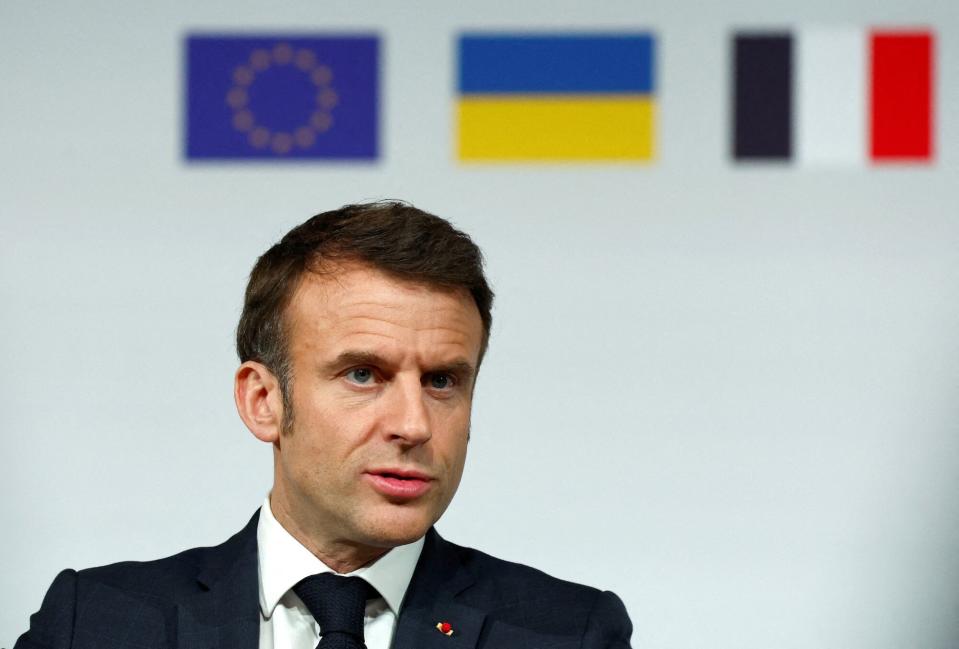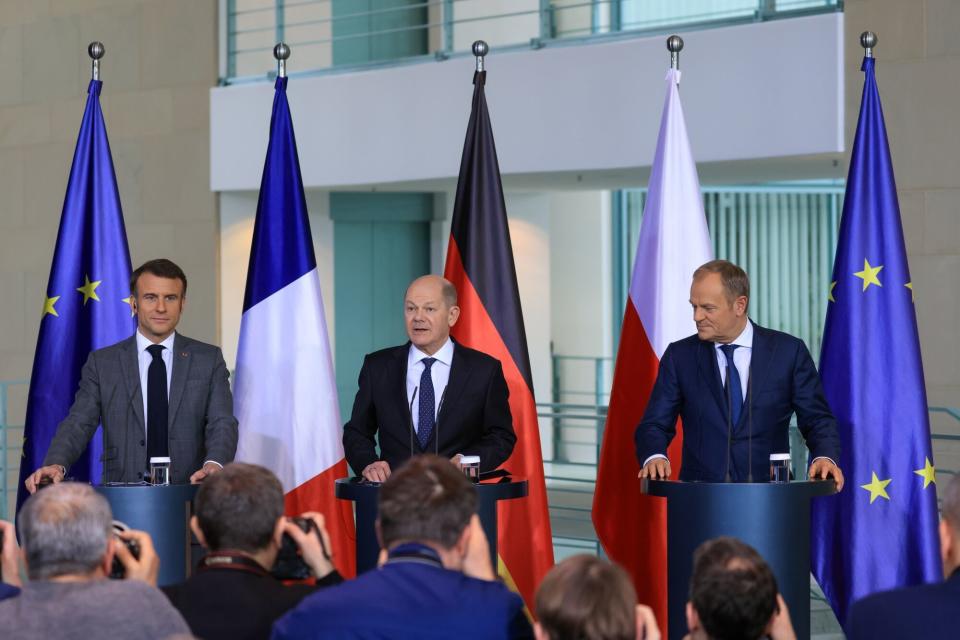Macron Piles Pressure on Europe to Take More Action for Ukraine
- Oops!Something went wrong.Please try again later.
- Oops!Something went wrong.Please try again later.
- Oops!Something went wrong.Please try again later.
(Bloomberg) -- French President Emmanuel Macron is ramping up pressure on German Chancellor Olaf Scholz to take a stronger stance in support of Ukraine with a dire warning of the “existential” threat Russia poses to the European Union.
Most Read from Bloomberg
US Probing Indian Billionaire Gautam Adani and His Group Over Potential Bribery
A $2 Billion Airport Will Test Modi’s Mission, Adani’s Ambitions
Fed Seen Sticking With Three 2024 Cuts Despite Higher Inflation
Bitcoin Extends Retreat From Record as ‘Bubble’ Talk Escalates
The two leaders will meet with Polish Prime Minister Donald Tusk in Berlin later Friday to discuss how to better provide aid to Ukraine, particularly military equipment.
Ukrainian President Volodymyr Zelenskiy’s troops are running desperately short of ammunition as they battle to hold off the Russian advances, fueling fears that a defensive collapse could see Vladimir Putin’s forces closing in on Kyiv once again. For their part, European nations have struggled to maintain unity, bickering over what kind of equipment to provide and whether to consider sending troops into Ukraine.
Macron’s bold stance seeks to rally Western allies behind Kyiv and step up support.
“Who can think for a second that President Putin, who hasn’t respected any of his limits or commitments, would stop there?” Macron asked during a joint interview with TF1 and France 2 television channels on Thursday. “The security of Europe and French people are at stake.”
Macron sparked tensions with allies two weeks ago by saying nothing should be ruled out when asked about putting boots on the ground in Ukraine. He argued strategic ambiguity was needed to deter Moscow. Scholz and the White House swiftly rebuffed the option, while Putin warned NATO risks a nuclear conflict if it sends troops to aid Ukraine.
Macron has sought to take a lead in Europe on support for Ukraine, organizing a leaders summit in Paris at which countries agreed on a plan to source much-need ammunition for the Ukrainian military outside the European Union, and signing bilateral defense pacts with Ukraine and Moldova. Last week he sent his top diplomat to Lithuania to drum up support from the Baltic states, which praised his sense of urgency.
“For a few years we’ve been living in a world where what we thought unthinkable is happening,” Macron said. “War is on European soil — there is less than 1,500 kilometers between Strasbourg and Lyiv.”
At the same time, Scholz has faced criticism for refusing to agree to Kyiv’s request to provide it with long-range Taurus cruise missiles. The chancellor has instead highlighted that Germany is one of Ukraine’s most generous backers, pledging military assistance worth around $30 billion.
Polish Foreign Minister Radoslaw Sikorski praised Germany’s bilateral aid to Ukraine in an interview with Gazeta Wyborcza and Ouest France, while also urging Berlin to do more. “I hope that Friday’s meeting of the Weimar Triangle will encourage Chancellor Scholz to take more decisive action.”
While the meeting in Berlin won’t be a game changer, it is the last chance for Scholz and Macron to mend fences ahead of decisive months for Ukraine, June’s European Parliament elections and the appointment of a new NATO leader, consulting firm Eurasia Group said in a note.
“It is good that we are coming together in the Weimar Triangle format at this time,” Scholz told reporters on Wednesday. “It is of course right to sit down and talk to each other now.”
He said ammunition and artillery for Ukraine were urgent matters to be discussed, insisting that his relationship with Macron is “very friendly.”
Asked about discord between Paris and Berlin, French European Affairs Minister Jean-Noël Barrot told LCI TV on Friday that the “bonds that unite Germany and France are unbreakable.”
“The Europeans are absolutely united around the Franco-German relationship in their determination to provide long-term support, for as long as necessary,” to Ukraine, he said.
In Macron’s TV interview, he blasted his domestic opponents who didn’t back a bilateral security agreement with Ukraine that was voted in parliament earlier this week.
“Abstaining and voting against support for Ukraine is choosing defeat,” he said.
Yet, backing for Ukraine among French voters is showing signs of fatigue. The portion of people who think Paris should maintain current levels of military help has fallen 9 points since last summer to 43%, according to a survey of 1,504 adults last week by pollster Elabe for BFM TV and La Tribune Dimanche newspaper. Four-fifths said they were worried at the idea of the war spreading beyond Ukraine and opposed putting French troops on Ukrainian soil.
“What’s happening in Ukraine?” Macron asked. “A war that is existential for our Europe and for France.”
--With assistance from Michael Nienaber.
(Recasts the top of the story, adds comment from Polish foreign minister.)
Most Read from Bloomberg Businessweek
An Influential Economics Forum Has a Troubling Surplus of Trolls
Gold-Medalist Coders Build an AI That Can Do Their Job for Them
©2024 Bloomberg L.P.




